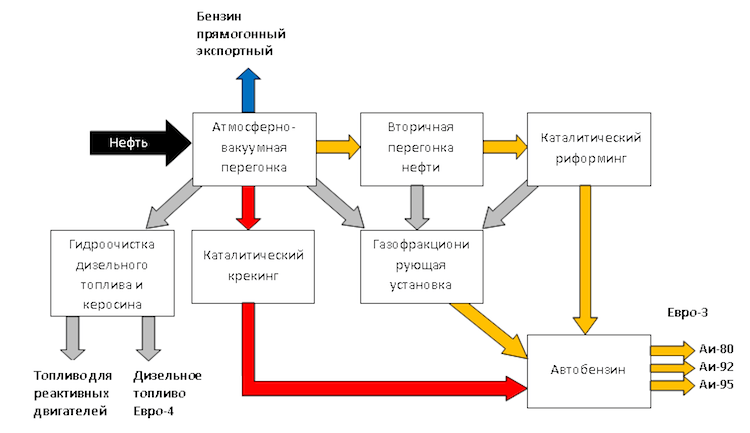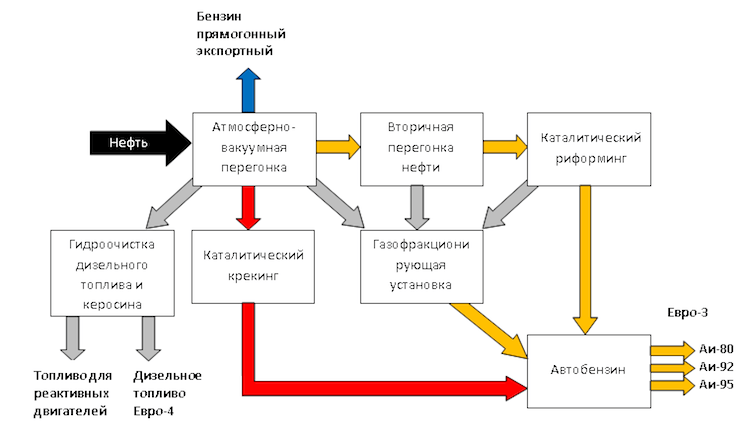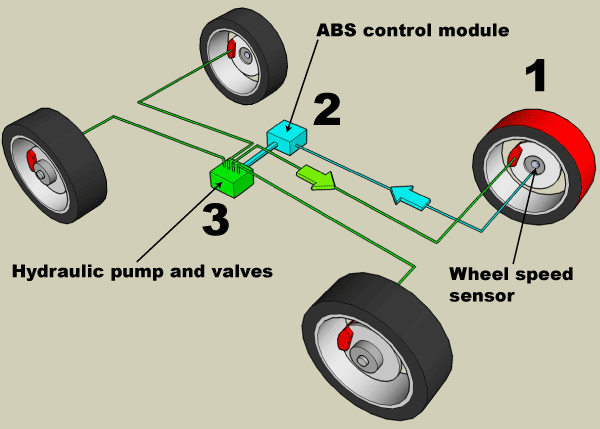
Chemical composition of gasoline AI 92, 95, 98
The composition of gasoline includes various chemical elements and compounds: light hydrocarbons, sulfur, nitrogen, lead. To improve the quality of fuel, various additives are added to it. As such, it is impossible to write the chemical formula of gasoline, since the chemical composition largely depends on the place of extraction of raw materials - oil, on the method of production and on additives.
However, the chemical composition of one or another type of gasoline does not have any significant effect on the course of the fuel combustion reaction in a car engine.
As practice shows, the quality of gasoline largely depends on the place of extraction. For example, the oil that is produced in Russia is much worse in quality than oil from the Persian Gulf or the same Azerbaijan.

The process of oil distillation at Russian refineries is very complex and expensive, while the final product does not meet EU environmental standards. That is why gasoline in Russia is so expensive. To improve its quality, various methods are used, but all this affects the cost.
Oil from Azerbaijan and the Persian Gulf contains a smaller amount of heavy elements, and, accordingly, the production of fuel from it is cheaper.
At the beginning of the twentieth century, gasoline was obtained by rectification - the distillation of oil. Roughly speaking, it was heated to certain temperatures and the oil was divided into different fractions, one of which was gasoline. This method of production was not the most economical and environmentally friendly, since all heavy substances from oil entered the atmosphere along with car exhaust gases. They contained a large amount of lead and paraffins, which caused both the ecology and the engines of the cars of that time to suffer.
Later, new methods for producing gasoline were found - cracking and reforming.
It is very long to describe all these chemical processes, but approximately it looks like this. Hydrocarbons are “long” molecules, the main elements of which are oxygen and carbon. When oil is heated, the chains of these molecules are broken and lighter hydrocarbons are obtained. Almost all oil fractions are used, and not disposed of, as at the beginning of the last century. By distilling oil by the cracking method, we get gasoline, diesel fuel, motor oils. Fuel oil, high-viscosity gear oils are obtained from distillation waste.
Reforming is a more advanced process of distillation of oil, as a result of which it became possible to obtain gasoline with a higher octane number, and the removal of all heavy elements from the final product.
The cleaner the fuel obtained after all these distillation processes, the less toxic substances are contained in the exhaust gases. Also, there is practically no waste in the production of fuel, that is, all components of oil are used for their intended purpose.
An important quality of gasoline, which must be paid attention to during refueling, is the octane number. The octane number determines the resistance of the fuel to detonation. Gasoline contains two elements - isooctane and heptane. The first is extremely explosive, and for the second, the detonation ability is zero, under certain conditions, of course. The octane number just indicates the ratio of heptane and isooctane. It follows that gasoline with a higher octane rating is more resistant to detonation, that is, it will explode only under certain conditions that occur in the cylinder block.

The octane rating can be increased with the help of special additives containing elements such as lead. However, lead is an extremely unfriendly chemical element, neither for nature nor for the engine. Therefore, the use of many additives is currently prohibited. You can also increase the octane number with the help of another hydrocarbon - alcohol.
For example, if you add one hundred grams of pure alcohol to a liter of A-92, you can get A-95. But such gasoline will be very expensive.
Very important is such a fact as the volatility of some components of gasoline. For example, to obtain A-95, propane or butane gases are added to A-92, which volatilize over time. GOSTs require gasoline to retain its properties for five years, but this is not always done. You can refuel A-95, which actually turns out to be A-92.
You should be alerted by the strong smell of gas at the gas station.
Gasoline Quality Study
Loading…
